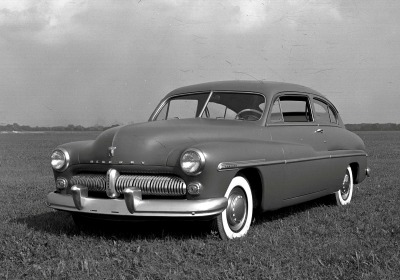Mercury dies off, Lincoln to benefit
Thu, 03 Jun 2010Ford's brand portfolio is set to get smaller by the end of the year. Following the sale of Aston Martin, Land Rover, Jaguar and most recently Volvo (to Chinese automaker Geely), the Blue Oval has now announced the demise of its 'middle of the range' Mercury brand, with production of the last vehicles set to cease at the end of 2010.
In a statement released to media, Ford announced that the shuttering of the 71-year old Mercury brand was in the interest of focusing on Lincoln, the automaker's only remaining premium brand. According to Ford, 'more investment and attention on standout product design' will now be made available to Lincoln, and the brand will see the addition of seven all-new or significantly refreshed vehicles in the next four years. Lincoln will also welcome its first-ever C-segment vehicle to the range, speculated to take the form of the C Concept revealed at the 2009 NAIAS in Detroit.
News of the forthcoming termination of Mercury has been a long time coming; the ill-fated brand has been creating rebadged Ford vehicles with little differentiation for a while now, so it's really no surprise. Current offerings in the lineup range from the mid-size Milan (a mildly revised Ford Fusion) and full-size Grand Marquis (a clone of the soon to be defunct Crown Victoria) sedans to the Mariner (Escape) and Mountaineer (Explorer) SUVs.
Not since the 1999 Cougar has Mercury had a bespoke product in its stable. According to Ford's own press statement, the brand holds a measly 0.8 percent market share in the US, even while Ford posted a 2.2 percent increase during the first five months of this year (overall Ford Motor Company has a 16 percent market share in the US). Mercury's lack of new product – and the resulting limited sales – essentially caused the brand to go the way of the rotary telephone.
Founded in 1939 by Henry Ford's son, Edsel – the name of another short-lived Ford brand that saw little success – Mercury was meant to be a stepping stone in automotive purchasing, much like Buick and Oldsmobile from cross-town rival General Motors. Those who had made enough money in their chosen careers could opt out of purchasing a common Ford product on their way to perhaps one day owning a luxury vehicle wearing the prestigious Lincoln badge. In an effort to change Mercury's perception from an upscale Ford to a more premium offering, Ford combined the brand with Lincoln in 1945, a company Henry Ford had purchased in 1922.
In the early years, Edsel Ford enlisted the help of Bob Gregorie, Ford's first design chief, to create cars like the 1939 Mercury Eight, one of the first vehicles designed using a full-scale clay model. The Eight, 1949 Coupe and Convertible and 1963 Marauder were performance-oriented versions of the Fords they were based on – famed racing car driver Parnelli Jones raced a Marauder up Pikes Peak in 1965 – and sold well at a time when suburban families were becoming increasingly reliant on the motor car.
The low-slung proportions of the 1950s-era cars, with their smoothed over but imposing chrome-adorned bodies and narrow DLOs, were a styling highlight for the brand and it garnered a following amongst rebellious youth – epitomized by a cameo in James Dean's 1955 film, Rebel Without a Cause. Mercury continued to make a name for itself through halo models such as the 1957 Turnpike Cruiser, 1958 Park Lane Brougham and the 1967 Cougar (based on Mustang), which featured in television advertisements alongside actress Farah Fawcett in 1975.
But that undeniable high point in Mercury's existence soon came to a crashing halt. From its inception, Mercury offered 'massaged' versions of an existing product sold under the Ford name, a business model that can no longer be maintained given today's saavy consumers. The offshoot brand really lost its way when it offered cars such as the Ford Taurus-based Sable, Topaz and Tracer in the 1980s and the Mystique, Villager minivan and unpopular Capri roadster in the 1990s; eventually culminating in the unloved vehicles of the current model lineup. That Ford has decided to euthanize the brand to focus on Lincoln can only be seen as a humane gesture.
Related Article:
Review: Lincoln Concept C
By Eric Gallina



